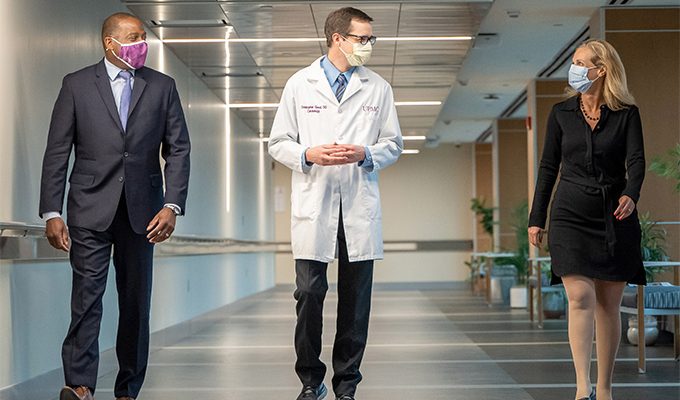UPMC Hamot has a history of breaking new ground when it comes to medical care.
In addition to boasting the region’s only certified trauma center, UPMC Hamot is a Certified Comprehensive Stroke Center, and in 2018, was the first in the nation to use robotic bronchoscopy technology in the battle against lung cancer.
Now, UPMC Hamot has added to this growing list of distinctions by raising the bar in cardiac care.
In September 2021, UPMC Hamot received its certification as a Comprehensive Cardiac Care Center from both the Joint Commission and the American Heart Association — a certification that means the hospital has delivered high quality clinical heart care over a set period of time.
In fact, UPMC Hamot is the first hospital in the UPMC system to achieve this independent stamp of approval.
The importance of the cardiac care certification is far-reaching not only for the hospital and the hospital system, but as a valuable resource toward population health in northwest Pennsylvania. The certification demonstrates integrated and coordinated care, early identification of high-risk patients, and timely patient education for informed decision making. The certification also contributes to ongoing quality improvement as related to patient care efficiencies and outcomes.
According to Marlow Levy, MBA, RN, FACHE, vice president of operations at UPMC Hamot, “This designation sends a message about the quality of care that patients can expect to receive here — as one of the best hospitals in the country to deliver comprehensive cardiac care.”
UPMC Hamot’s participation in the Comprehensive Cardiac Care Center certification program was completely voluntarily, but gave the hospital a rigorous review of its performance as well as cardiac care standards in such areas as heart attacks, heart failure, cardiac resuscitation, arrhythmia management, cardiac catheterization, heart stents, coronary bypass/valve treatment, and cardiac rehabilitation.
“We didn’t work to achieve the certification because we had to, but because it is the right thing to do for our patients,” says Levy.
The review process started in July 2021 and was completed in September 2021 — in the midst of the COVID-19 pandemic. The findings: UPMC Hamot was recognized with high honors for its procedural outcomes, quality control and patient access.
“At a time when our staff were pushing to take care of the patients in this unprecedented era of the pandemic, they were also focusing on not losing anything in terms of quality in cardiac patient care,” states Levy. “I believe that speaks to the level of professionals we have here within the cardiac program and at UPMC Hamot.”
Integrated and Coordinated Care
Critical to the certification was UPMC Hamot’s coordination of cardiac care along the care continuum — which included community initiatives and patient education, inpatient and outpatient care, rehabilitation, and interviews with patients and families.
“This certification is not just a hospital certification,” explains Deborah Pora, DNP, CRNP, ANP-C, RCIS, clinical director at the UPMC Heart and Vascular Institute at UPMC Hamot. “This is truly comprehensive from how we service the community to all the way through to post discharge.”
The review examined UPMC Hamot’s emergency department, critical care units, operating rooms, cath labs, radiology services and pharmacy labs, as well as its outpatient clinics hosted through the UPMC Hamot Center for Healthy Living at 3330 Peach Street in Erie. The facility houses UPMC Hamot’s outpatient cardiopulmonary rehabilitation program, and is also a community resource for health fair clinics, as well as diabetes and smoking cessation courses — including those held virtually because of the pandemic.
The review also examined UPMC Hamot’s collaboration with other community hospitals in the tri-state area and within the UPMC system, an area in which UPMC Hamot excels as a model for best practices. Equally important to the review was the education and resources available to patients and their families to make informed decisions pre- and post-procedure.
“They looked at our scope of care, our treatment, our services and our center’s philosophy, focusing on patient population and community demographics and how we are serving them,” notes Pora. “They looked at leadership responsibilities, accountabilities, backup systems and our integration and collaboration.”
Approximately 100 health-care professionals were involved in the certification process. Auditors looked at all different types of team members, whether they were a nurse practitioner, a nurse, a respiratory therapist, or a surgeon, and conducted a thorough inspection of their training, orientation, education and their role in cardiac care. “For example, our nursing staff here have a matrix with the cardiac care service line, so that we’re ensuring its practice and benchmarks and best practices are coordinated throughout the entire system,” says Levy. “That, in turn, helps us to make sure that we’re following those best practices when we’re educating and caring for our patients, and taking care of them in a coordinated fashion.”
Read more in the February 2022 edition of the Business Magazine.












